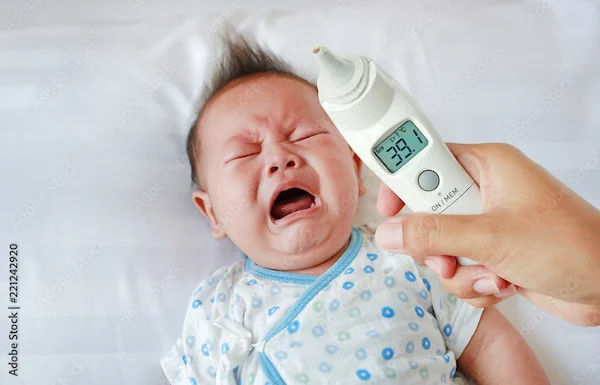Fever Treatment Guidelines
Let’s know the basics of dealing with fever including symptoms, remedies, treatment and prevention to better manage the condition and stay healthy.

Written by Dr Sonia Bhatt
Last updated on 3rd Jul, 2025
Fever is a common medical condition where the temperature of the human body rises, often signalling a natural response to any underlying condition. Theoretically, when the temperature of the body rises over 98.6°F (37°C), it is considered a fever. But, it is important to note that fever is not a disease but an indicator of other health concerns. The common causes of fever start from seasonal flu, bacterial infections, heat exhaustion, etc. So, understanding this condition in detail and its treatment and preventive methods will help individuals combat it better and attain success quickly.
Understanding the Symptoms
Fever manifests as increased body temperature accompanied by sweating and chills. Depending on the individual's underlying condition, the rise in temperature may range from mild to severe.
- Thus, the common fever symptoms play a key role in recognising this condition and commencing the treatment. The symptoms include:
- Primary Symptoms: Increased body temperature over 100.4°F or 38°C, and chills, and sweating.
- Common Associated Symptoms: Headache, muscle aches, fatigue, loss of appetite, and dehydration.
- Severe Symptoms Requiring Medical Attention: High fever (above 103°F or 39.4°C), breathing difficulty, chest pains, confusion, seizure, or continued vomiting.
Initial Home Remedies
There are different ways to bring down fever at home and provide relief to the sufferer. These home remedies are:
- Temperature Management: Temperature management is an excellent first step in tackling fever. So, take a wet piece of cloth and place it on the head, especially on the forehead of the suffering individual. Lukewarm baths further assist in lowering the temperature. However, do not use heavy blankets and thick clothing because they trap heat.
- Hydration and Rest: Another excellent remedy is taking plain water, herbal teas, and clear soups to maintain the balance of water in the body. Resting is also compulsory, and individuals should not be involved in any heavy activities.
- Using a Cool Compress: Using a wet towel to reduce the body temperature is another solution. Individuals can do so every 15 to 20 minutes, but they must not take cold water or ice as they will make their bodies shiver.
Over-the-Counter Medications: Individuals can use acetaminophen or ibuprofen to reduce fever and improve their health within a couple of days. But if the situation persists or worsens, they need to see a doctor for further diagnosis and treatment.
When to See a Doctor?
Understanding when it is time to consult a doctor is important to avoid complications. Here is how individuals can do that:
- High Fever: In case the body temperature reading is persistently near and over 103°F (39.4°C) for more than three days, one should consider seeing a doctor.
- Difficulty Breathing: If there is chest pain or shortness of breath, an immediate intervention is required.
- Severe Headache or Stiff Neck: These might point to meningitis or some other severe condition that requires medical attention.
- Unresponsiveness or Confusion: These symptoms may indicate severe infection or an emergency condition.
Having said that, it is important to remember that people suffering from fever will mildly experience the above-mentioned symptoms. However, if their intensity and duration increase, it is a sign of trouble. For instance, if the fever is down even after taking medicines or the patient continuously struggles to breathe, it is time to see an expert.
Medical Treatment Options
Sometimes, the fever is severe and needs a more complex intervention to resolve and avert complications. According to the severity and cause of the fever, the following medical treatments might be prescribed.
Prescription medications like –
- Antibiotics: Ideal for bacterial infections.
- Antiviral Medications: Usually, they help lessen the intensity and duration of the symptoms associated with viral infections.
- Antipyretics: For high fevers, over-the-counter and prescription drugs can be taken.
Hospitalisation and supportive care options like –
- Intravenous Fluids: Intravenous fluids may be required if the fever has induced dehydration.
- Oxygen Therapy: This is used in the event of a fever with breathing problems.
- Monitoring: Severe conditions may warrant admission to a hospital for constant monitoring and avoiding consequences.
A doctor may order a few blood tests and imaging scans to try to find out the root cause and effects of the fever.
Get Personalised Care from Experts
Special Considerations for Children and Elderly
Fever is a condition that children and the elderly have to be very careful with, as they respond differently to the illness.
- Children: Recognising the fever is crucial as children struggle to communicate their discomfort effectively.Symptoms such as irritability, reduced activity, and loss of appetite, along with a steady rise in body temperature, often signal fever in children. In such cases, urgent medical attention is important, especially for infants and toddlers as they have a developing immune system.
- Elderly People: The signs of fever can be less apparent due to factors like a weak immune response. They may experience atypical symptoms like confusion, fatigue, or a sudden decline in appetite rather than a noticeable rise in body temperature. Managing fever in older individuals includes some basic medication, a nutritious diet, proper hydration, and rest.
Fever in Relation to Infections
A fever is commonly a symptom of an existing infection in a person’s body. A complete understanding of the concept of fever and associated infections will be of great help in an attempt to ascertain the root cause of the problem and choose the appropriate treatment. Here is how fever relates to different types of infections:
- Viral Infections: The illness is caused by viruses like influenza and the normal flu. These usually clear up on their own after some time with adequate consumption of fluids and proper rest.
- Bacterial Infections: Some bacterial infections, such as pneumonia and other urinary infections, cause persistent fever and call for antibiotics and tailored treatment depending on the condition.
- Fungal and Parasitic Infections: In addition to bacterial infections, malaria or candidiasis may also lead to fever. Management here includes the use of an antifungal or antiparasitic drug.
Preventive Measures
Infections that cause fever are dangerous, so trying to avoid them is essential to remain healthy. The following measures can go a long way in preventing infections that lead to fever:
- Vaccination: Tailored vaccination is an excellent preventive measure against fever.
- Good Hygiene Practices: Maintaining personal hygiene, cleanliness, and proper distancing from infected individuals helps.
- Safe Food Handling: Properly handling foods averts food-borne diseases, which can lead to fever.
Lifestyle and Dietary Factors
Fever results from a weakened immune system, which can be avoided through lifestyle changes. Here is how one can do that:
- Following a Nutritious Diet: When taken in decent proportions, vitamins and minerals help boost the immune system. Minerals, including vitamins C and D, zinc and antioxidants, play an important role in offering protection from infections. Drinking water is essential to help the immune system remain healthy.
- Practice Stress Management: Some forms of stress-relieving exercises, like yoga, deep breathing, exercise, etc., help strengthen the immune system. Stress can be dealt with through mindfulness and relaxation techniques that also boost the immune system.
- Getting Adequate Sleep: Sleep is also important for the body’s healing processes as well as for keeping the immune system in check. Staying on a fixed sleep timetable and having a comfortable sleep environment improves the immune system.
- Avoiding Harmful Habits: Refraining from taking alcohol and avoiding any sort of tobacco products can improve the immune system.
Conclusion
Fever is an indication of underlying health conditions, from viral bacterial infections to heat exhaustion. Thus, understanding the symptoms, causes, and treatment options helps manage the condition and prevent further complications. While home remedies help, knowing when to intervene and seek medical assistance is equally important. However, individuals should focus on preventive measures to improve overall health and well-being.
Consult Top General Physicians
Get Personalised Care from Experts

Dr. Swathi Reddy Perugu
General Physician/ Internal Medicine Specialist
7 Years • MBBS, MD (General Medicine)
Hyderabad
Health plus, Hyderabad

Dr. Rajib Ghose
General Practitioner
25 Years • MBBS
East Midnapore
VIVEKANANDA SEBA SADAN, East Midnapore

Dr. Rajib Ghose
General Physician/ Internal Medicine Specialist
26 Years • MBBS
Kolkata
B Ghose Foundation Doctor's Chamber, Kolkata
(25+ Patients)

Dr. Chethan T L
General Physician/ Internal Medicine Specialist
5 Years • MBBS, MD, DNB (General Medicine)
Bengaluru
Apollo Medical Center, Marathahalli, Bengaluru

Dr. Sunil Nigam
General Physician/ Internal Medicine Specialist
48 Years • MBBS, MD ( General Medicine)
New Delhi
VIVA VISION, New Delhi
Consult Top General Physicians

Dr. Swathi Reddy Perugu
General Physician/ Internal Medicine Specialist
7 Years • MBBS, MD (General Medicine)
Hyderabad
Health plus, Hyderabad

Dr. Rajib Ghose
General Practitioner
25 Years • MBBS
East Midnapore
VIVEKANANDA SEBA SADAN, East Midnapore

Dr. Rajib Ghose
General Physician/ Internal Medicine Specialist
26 Years • MBBS
Kolkata
B Ghose Foundation Doctor's Chamber, Kolkata
(25+ Patients)

Dr. Chethan T L
General Physician/ Internal Medicine Specialist
5 Years • MBBS, MD, DNB (General Medicine)
Bengaluru
Apollo Medical Center, Marathahalli, Bengaluru

Dr. Sunil Nigam
General Physician/ Internal Medicine Specialist
48 Years • MBBS, MD ( General Medicine)
New Delhi
VIVA VISION, New Delhi




